8. Middle America.
As we have seen in earlier classes, the European operetta tradition reveled in exotic environments that few could experience in
real life. Some later American writers responded with urban settings that were all too real to many, but equally
unknown for audiences who could afford a Broadway ticket. Then in the Fifties came along two shows that found charm
in Iowa settings featuring middle-class Americans in Middle American towns. And both centered on the American
preoccupation with business. The Pajama Game (1954), by Richard Adler and Jerry Ross, is set
in a world of efficiency experts and worker's unions, and is surely the only musical to include a duet with a
Dictaphone. The Music Man (1957), with book, music, and lyrics by Meredith Willson, opens
with a bunch of traveling salesmen arguing in a railroad car, and the title character is a pitchman extraordinaire
with a winning charm. rb.
The script, videos, and images will be posted immediately after class.
Q AND A
What happened this morning?
A perfect storm of events. The facility set up for the weekend's seders rather than class. Equipment that did not function as expected. And
no time to toubleshoot it in advance—as the wonderful Kristina ultimately did—because the poor man from the travel agency needed to explain
about his company's Osher trip offerings first. Plus long delays due to crashes on both the roads I would normally have taken getting down to
Gaithersburg (and a further one-hour delay at the tunnel coming back) which ran me a little ragged. So I apologize for any incoherence at
the beginning, and am just grateful for your willingness to run with the flow.
Did the advent of shows in ordinary settings coincide with any shift in audience demographics?
Excellent question from Bill, but one that I still can't answer—sorry. However, in trying to look that up, I came upon this wonderful
article in The
Guardian by director Richard Eyre, clearly a Brit of my own generation; I don't know why he is so hard on the movie, though. The
article also includes a link to a
gallery of photos from
various productions of the show.
VIDEO LINKS
Most scenes I showed in class are available on YouTube, though not always from the source I used. The movie of The Pajama
Game can be streamed here
free; it has ads, but they are placed between numbers, and don't interrupt the flow. The times in brackets after each
title are the cues where the numbers occur in this version. but each is also a link to a clip from movie available separately on
YouTube, followed by compilations from the 2006 Broadway revival.
The movie of The Music Man can be rented here
for about $3. All the numbers we saw, however, are available on YouTube as separate clips at the links below. I also threw in a couple of other scenes,
plus some extracts from the recent revival with Hugh Jackman.
Note that you will find numerous high-school and amateur productions of both shows, plus an apparently bootlegged
video of the Broadway Music Man with Hugh Jackman. While
none of these were high enough quality for me to play, they do indicate what the show is like on an actual stage. rb.
*Asterisks indicate clips not seen in class—including the clips from How to Succeed in Business,
which I had to cut entirely to make up for lost time.
| THE PAJAMA GAME |
| |
Movie, 1957 |
|
* Credit Sequence
(0:00)
* Hey there
(24:50)
* Once-a-Year Day
(37:35)
* There Once Was a Man
(50:43)
* Steam Heat
(59:28)
* Hernando's Hideaway
(1:19:03)
* Seven-and-a-Half Cents
(1:34:09)
|
| |
Broadway, 2006 |
|
* Hey there
(Harry Connick, part of longer compilation)
* There Once Was a Man
(Harry Connick, Kelli O'Hara)
* Hernando's Hideaway
(Megan Lawrence, Harry Connick on piano)
|
| |
| HOW TO SUCCEED IN BUSINESS… |
| |
The Company Way |
|
* Movie, 1957
(Robert Morse, Sammy Smith)
|
| |
The Brotherhood of Man |
|
* Movie, 1957
* Broadway, 2011
(Daniel Radcliffe at Tonys)
|
| |
| THE MUSIC MAN |
| |
Movie, 1962 |
|
* Train scene
* Iowa Stubborn
* Trouble in River City
* Seventy-Six Trombones
* Pick-a-Little
* Library Scene
* Shipoopi
* Till There Was You
* Harold gets caught
* Ending sequence
|
| |
Other clips of opening scene |
|
* Asolo Rep, live
(excellent stage production)
* Hugh Jackman
(brilliant turn on Jay Leno Show)
|
| |
|
|
|
|
|
| IMAGES |
The thumbnails below cover the slides shown in class, though
there may be a few small discrepancies. Click the thumbnail to see a larger image.
Click on the right
or left of the larger picture to go forward or back, or outside it to close. |
 | |
 | |
 | |
 | |
 | |
 | |
 | |
 | |
 | |
 | |
 | |
 | |
 | |
 | |
 | |
Here are brief bios of the artists, composers, and writers considered in the class, listed in order of birth.
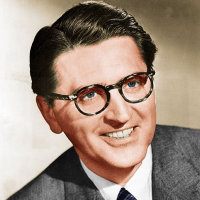 |
Meredith Willson, 1902–84. American writer and composer.
Willson, who attended the predecessor of the Juilliard School, was an accomplished classical flutist who played with the NY Philharmonic under Toscanini. As a composer, he made his name with film scores, including Charlie Chaplin's The Great Dictator. His 1951 song, "It's beginning to look at lot like Christmas," has become a holiday classic. But he is best known for writing the book, lyrics, and music for The Music Man (1957), which he called his Valentine to his home state of Iowa.
|
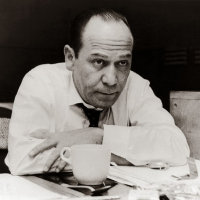 |
Frank Loesser, 1910–69. American writer and composer.
Loesser wrote over 700 songs in his 40-year career, together with the musicals Guys and Dolls, How to Succeed in Business Without Really Trying, The Most Happy Fella, and the film Hans Christian Anderson.
|
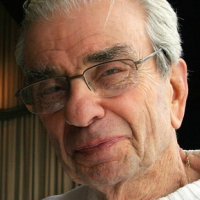 |
Richard Adler, 1921–2012. American writer and composer.
After receiving a musical education from his father, who at one time also taught Aaron Copland, Richard Adler entered into a creative partnership with Jerry Ross, woking togeher under the mentorship of Frank Loesser. They collaborated on the music and lyrics (both did both) for The Pajama Game (1954) and Damn Yankees (1955). After Ross died prematurely in 1955, Adler continued to write but never again achieved such fame.
|
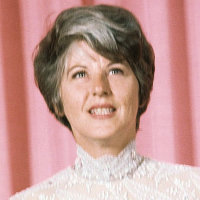 |
Onna White, 1922–2005. Canadian choreographer.
White was 12 before she began taking dance lessons in her native Nova Scotia, but dance would take her all the way across the continent to the San Francisco Ballet. By 1947, she was dancing on Broadway, and by 1957 was choreographing shows such as The Music Man, Irma la Douce, and Mame. She won an Oscar for her choreography of Oliver! in 1968.
|
 |
Jerry Ross, 1926–55. American writer and composer.
Born Jerold Rosenberg, Ross was a singer with the Yiddish theater in his youth. In 1950, he met Richard Adler and together, under the mentorship of Frank Loesser, they wrote both words and music for The Pajama Game (1954) and Damn Yankees (1955). Ross died in 1955 of lung disease at the age of 29, bringing to an end one of the most promising partnerships on Broadway.
|
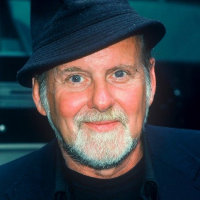 |
Bob Fosse, 1927–87. American choreographer.
Bob (Robert Louis) Fosse was a pioneering choreographer and later director, noted especially for jazz dance. His choreographic work was first seen on screen in a duet he danced with Carol Haney in Kiss Me, Kate in 1953. He went on to choreograph numerous Broadway shows from The Pajama Game (1954) to Chicago (1975) and direct movies including Sweet Charity (1969) and Cabaret (1972).
|
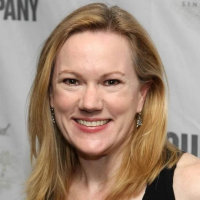 |
Kathleen Marshall, 1962– . American director and choreographer.
A Wisconsin-born alumna of Smith College, Marshall began her Broadway career as assistant to her brother Rob, working with him on half-a-dozen musicals before she struck out on her own. Working both as director and choreographer, she has won awards for both the 2006 revival of The Pajama Game and the 2011 production of Anything Goes, which later had similar success in London.
|






















